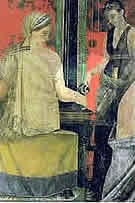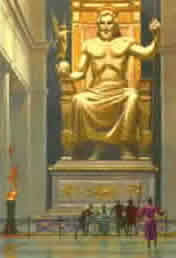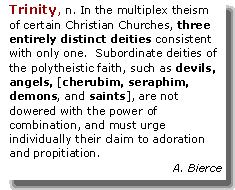| |||||||||||||||||||||||||||||||||
| Facts > Pagan Ideas > Monotheism | ||||
| Christianity thinks it has monotheism—Paganism had it first |
  Was Christianity new and unique? Let's talk about the idea of a single high God. If you're like me, you were brought up thinking the ancients were simple folk understood divinity in terms of simple mythology. In fact quaint village myths didn't make it in the large cities. The idea of a single High God predated Christianity by centuries, and was in fact central to mainstream ancient philosophies / theologies you've probably heard of. |
|
Pagan monotheism One was the philosophers' monotheism. As early as the fifth century BC, in Greece, fellows like Socrates and Plato doubted and attacked the old village myths, the fables about the many Gods living up on Mount Olympus. They denied the fables and replaced them with the notion of a single God. This was pure monotheism.
|
|
|
Christianity began with the Jews' Great God (and demons and devil), added the Pagan idea of a mother of God and the Pagan idea of a Son of God, and added the Pagan philosophers' idea of the Logos (Holy Spirit). Yeah, but wait, the Christian Trinity of the three different Gods convolved as one God, that's monotheism. Well, you can say that, and we can still be friends, but to me it's a kludge. And anyway the Christians didn't get this theory down straight until the fifth century AD. And of course besides the Trinity, there are the other Christian demi-Gods—angels, demons, cherubim, saints, satan. And that my friend, is as Pagan as it gets. Christianity has one Great God, in the model of Zeus or Isis, and lesser Gods, in the model of Apollo or Osiris. Christianity has angels, and demons, and devils—all supernatural beings. That's Paganism, pure and simple. |
|
Christianity thinks it has monotheism—Paganism
had it first
|
|
Christianity thinks it has monotheism—Paganism
had it first
|
|
Did the early Christians understand the Pagan ideal of One High God? Yes, they did. Listen to the Christian Justin Martyr, writing in the second century AD. |
He calls Jupiter "the governor and creator of all things." [First Apology, 21] |
|
Christianity thinks it has monotheism—Paganism
had it first
|
|
The next time you're in Church You'll know you're hearing about stuff that predated Christianity by hundreds of years—in a culture where over and over people built new religions out of old parts. Wow! |
|
Here are three examples of ancient monotheistic philosophies / religions.
Plato believed the word was created by a single supreme being, a Demiurge. His dialogues (Timaeus is a good place to start, if you're of a mind) often have Socrates chatting with someone or other over the nature of the Demiurge. For us, the point is Plato believed in ONE creator. Middle Platonism developed about 100 BC. Christian apologist Ronald Nash writes: "Middle Platonism was primarily not an abstract philosophical system, but a system of theology and religion. 'The religion of a Middle Platonist consisted of a remote intellectual devotion to the remote Supreme, to the vision of whom he hoped to attain in the next life.' " Did Christianity borrow from Platonism? "We shall seem to utter the doctrine of Plato," says Christian apologist Justin Martyr [Justin Martyr, First Apology, 20, second century AD]—but, he says, through the intervention of malignant demons, this borrowing really happened in reverse! The point for us: the idea of a single supreme being—of one God—was a familiar part of ancient culture. The next time you're in Church, ask yourself: "What about what
I'm hearing was new with Christianity, and what was already part of
other religions in a culture where over and over again new religions
were built with old parts?" When they get to the part about one
God, maker of Heaven and Earth and of all things visible and invisible,
remember Plato. You'll know you're hearing about stuff that predated
Christianity by hundreds of years. Stoicism The stoics (the system began in the fourth century BC) thought God and the world were related like soul and body. God is the soul of the world. The world is the body of God. Here's how the Roman Emperor (and stoic) Marcus Aurelius put it, "There is one universe made up of all things, and one God who pervades all things, and one substance, and one law, one common reason in all intelligent animals, and one truth." [The stoics believed a lot of other interesting stuff, much of it explained clearly and concisely in Nash.] The point for us: the idea of a single supreme being—of one God—was a familiar part of ancient culture. The next time you're in Church, ask yourself: "What about what
I'm hearing was new with Christianity, and what was already part of
other religions in a culture where over and over again new religions
were built with old parts?" When they get to the part about one
God, maker of Heaven and Earth and of all things visible and invisible,
remember Zeno and Marcus Aurelius and the great philosophy/religion
Stoicism. You'll know you're hearing about stuff that predated Christianity
by hundreds of years. Solar Monotheism Even the mythologies developed into monotheisms, particularly in Asia Minor where people understood there to be one God, usually associated with the sun, under which there were other lesser anthropomorphic Gods. The Egyptians, for example, worshiped the physical sun as the symbol of the one transcendent God—of which the other Gods were attributes. The ancients understood the universe—physical and spiritual—in terms of hierarchy (see Celestial Spheres, right below). Between the High God and man they placed the lesser Gods, who they sometimes understood not as individual, independent beings but as attributes of the High God. The middle Gods were anthropomorphized, the High God was more often abstract, ideal, perfect. The point for us: the idea of a single supreme being—of one God—was a familiar part of ancient culture. The next time you're in Church, ask yourself: "What about what I'm hearing was new with Christianity, and what was already part of other religions in a culture where over and over again new religions were built with old parts?" When they get to the part about one God, maker of Heaven and Earth and of all things visible and invisible, remember Solar Monotheism. You'll know you're hearing about stuff that predated Christianity by hundreds of years.
|

 When they get to the part about one God, maker of Heaven and
Earth and of all things visible and invisible, remember Cicero, Celsus,
Origin, St. Justin Martyr and the rest.
When they get to the part about one God, maker of Heaven and
Earth and of all things visible and invisible, remember Cicero, Celsus,
Origin, St. Justin Martyr and the rest. 